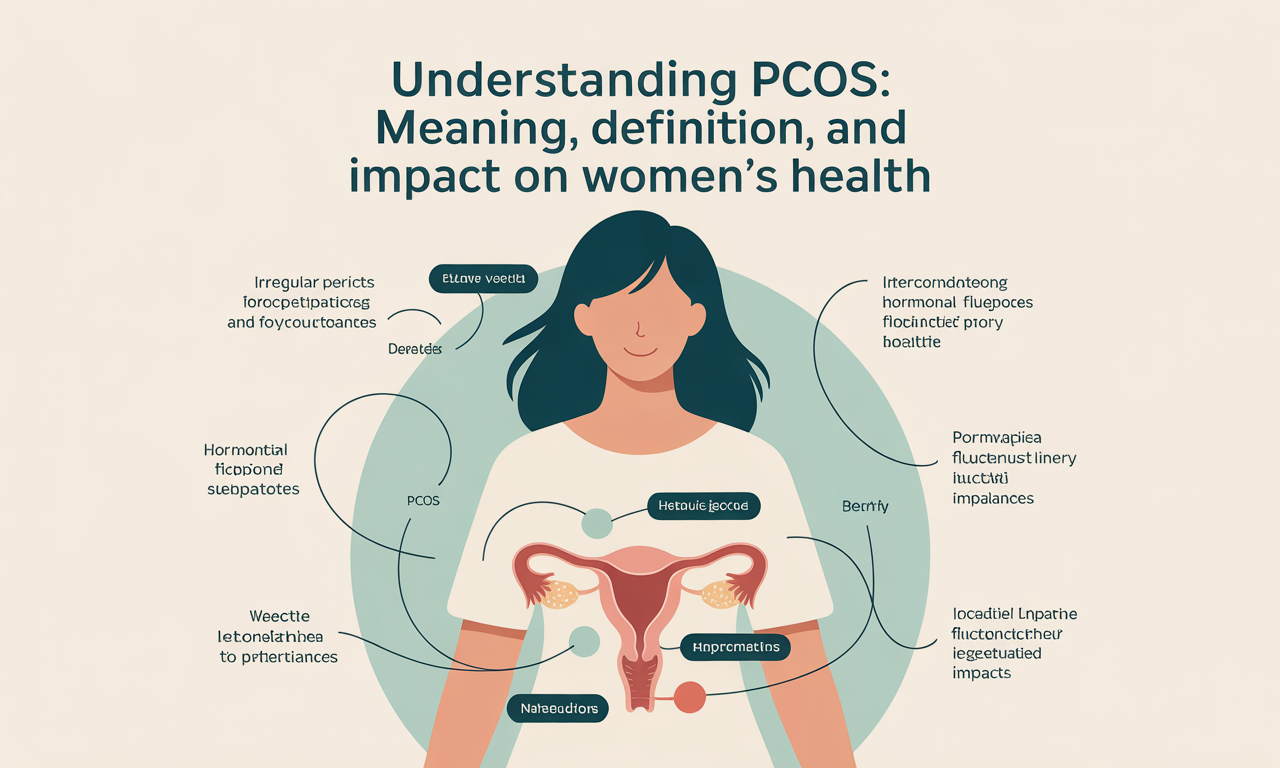Polycystic Ovary Syndrome, or PCOS for short, is a condition that millions of women suffer from worldwide, but it is frequently misunderstood or overlooked. This long-term health problem disturbs the hormone balance and induces symptoms that involve the ovaries, the menstrual cycle, the reproductive system, fertility, the metabolism, and mental state. Though most women with PCOS live with it without ever realizing it, the first step to managing PCOS is to understand what it is and what it means for your body.
What Is PCOS?
PCOS is an endocrine disorder in which a woman’s ovaries make too much androgen, which are male hormones that women also make in small amounts. This misalignment of hormones can disrupt ovulation, resulting in irregular periods, ovarian cysts, and infertility. Although it’s called PCOS, not every woman with PCOS has ovarian cysts, so the name can be a bit confusing.
PCOS Meaning in Medical Terms
PCOS stands for Polycystic Ovary Syndrome and, medically, is a condition where there are many (“poly”) small cysts in the ovaries. The cysts are immature eggs or follicles that didn’t ovulate. Although the name suggests a gynecologic problem, PCOS is now recognized as an endocrine/metabolic condition; it is a multisystemic problem that needs multidisciplinary care.
PCOS Definition: More Than Just a Reproductive Problem
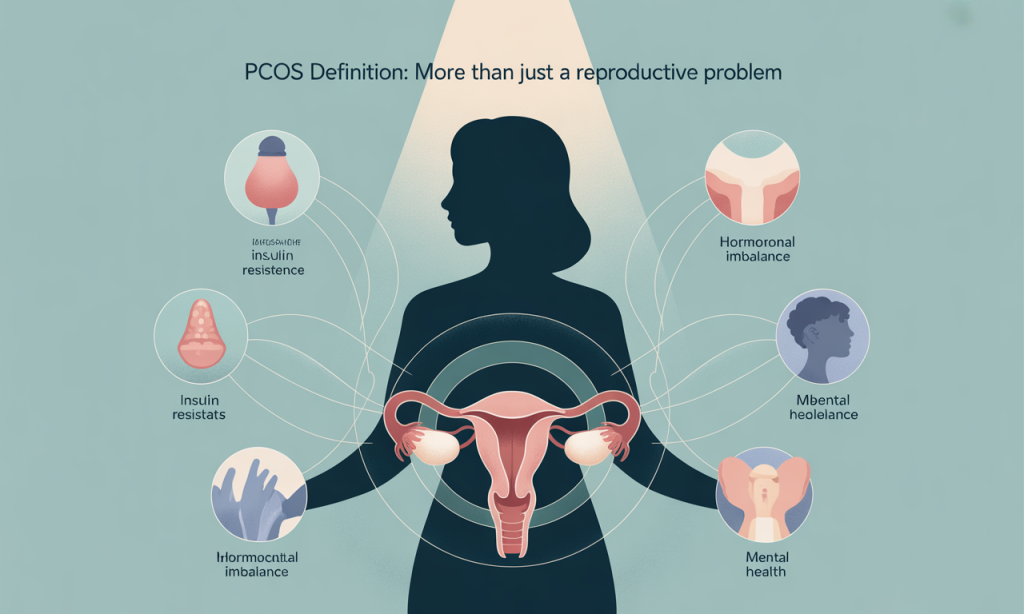
Put simply, PCOS is a hormonal disorder that affects the way a woman’s ovaries work. But while PCOS is a reproductive condition, it’s much more than that. It can cause insulin resistance, weight gain, acne, hair loss, excess growth of hair in the face and body (hirsutism), and mood disturbances. RE: And so it should be noted not only for its effects on fertility but also its systemic effects.
How PCOS Is Diagnosed
PCOS is typically diagnosed using the Rotterdam criteria, which call for at least two of three significant signs: infrequent or nonexistent periods, signs of excess androgens (such as acne or facial hair), and polycystic ovaries visible on ultrasound. Blood work may be performed to evaluate hormone levels such as LH (luteinizing hormone), FSH (follicle-stimulating hormone), testosterone, and insulin.
Causes and Risk Factors of PCOS
The exact cause of PCOS remains unknown, but studies suggest the possible role of genetics, environmental factors, and lifestyle factors. If you have a first-degree relative (such as a mother or sister) with PCOS, your risk of developing it is higher. Other factors include obesity, insulin resistance, chronic inflammation, and exposure to endocrine-disrupting chemicals.
PCOS Problem: A Growing Global Concern
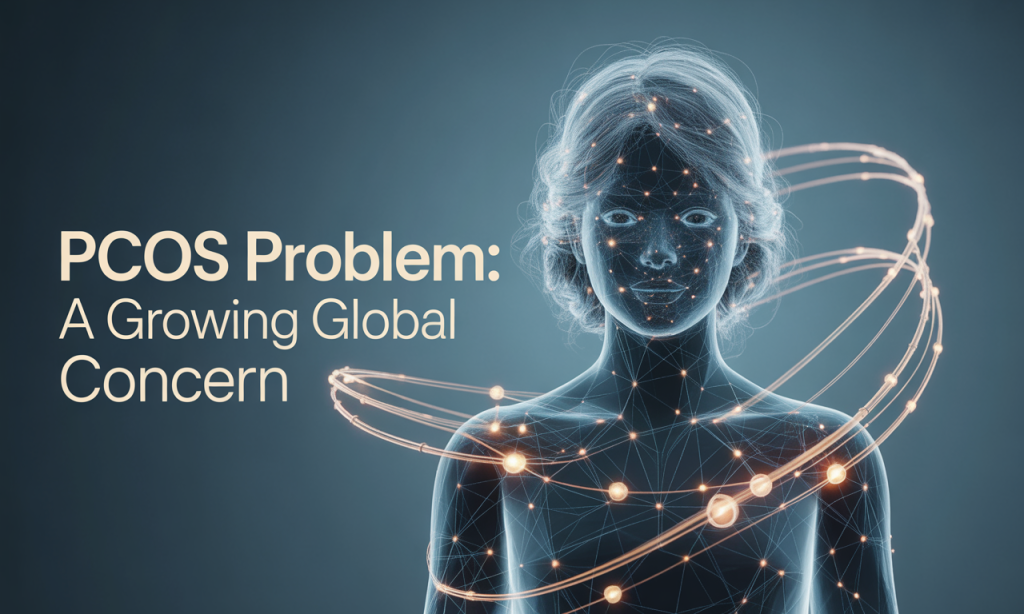
PCOS is a growing global women’s health issue, particularly due to changes in lifestyle toward inactivity and processed diet. 1 in 10 women of childbearing age have it. The prevalence is higher in regions such as South-Asian countries, including Pakistan and India, where it is caused by genetic susceptibility and a lack of awareness about reproductive health.
Emotional and Mental Health Impact of PCOS
It’s beyond physically challenging to live with PCOS. A lot of women also say they suffer from anxiety, depression, low self-esteem, and body image issues. The irregularity of periods, unwanted hair growth, acne, and weight gain are all symptoms that can make us feel out of control. It’s crucial to recognize this psychological toll and, if possible, to get support in addition to medical intervention.
PCOS vs. Normal Ovary Function
In a normal (healthy) ovary, one mature egg is released each month during ovulation. But in PCOS, it is the hormonal imbalance that causes ovulation not to happen routinely. This can lead to missed periods and inability to have children. The ovaries may be enlarged and have many small cysts that do not grow to maturity (hence the name “polycystic”).
Long-Term Health Risks Associated with PCOS
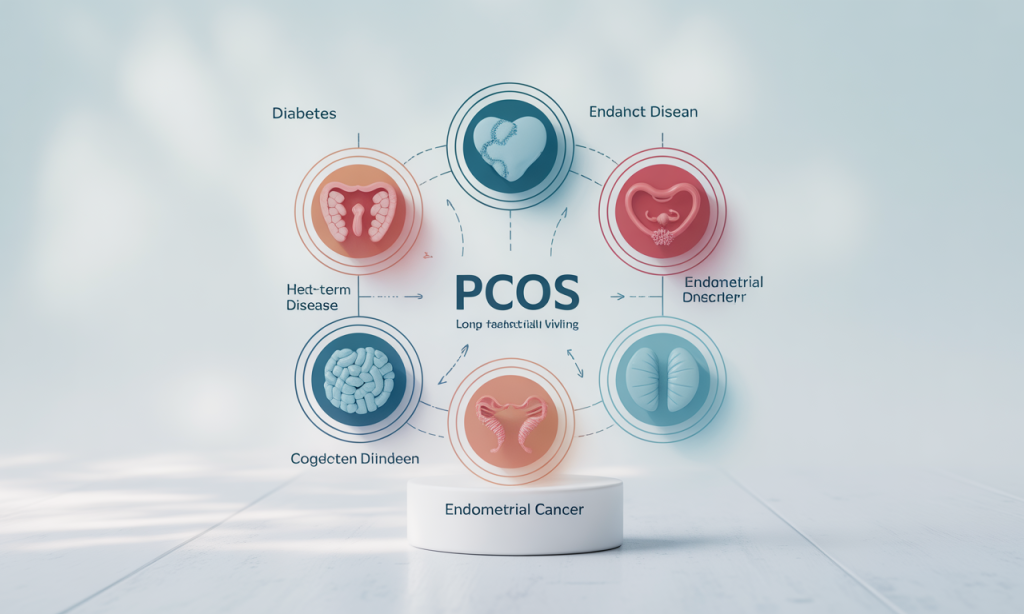
If not controlled, PCOS can cause several long-term complications, including type 2 diabetes, high blood pressure, heart issues, endometrial cancer, and sleep apnea. It also raises questions during pregnancy, with an increased risk of gestational diabetes and miscarriage. That’s why it’s so important to be diagnosed early and to make the lifestyle changes.
Managing PCOS Through Diet and Exercise
Maintaining a clean diet with plenty of whole grains, lean proteins, good fats, and low-glycemic index foods can help with insulin and hormone balance. Running to lose weight is an effective way to keep your weight in check if you’re exercising at least twice a week, to the point of feeling breathless. Symptoms can be alleviated simply by losing 5-10% of body weight.
Treatment Options for PCOS
There is no cure for PCOS, but you can manage the symptoms with several treatments. Birth control tablets may be used to control menstrual periods and the amount of androgens produced. Hair and acne problems can be treated with certain medications, including anti-androgens like spironolactone. Metformin is a drug prescribed for diabetes to enhance insulin sensitivity. Always see a doctor before taking any medicine.
Fertility Concerns with PCOS
Fertility is a common concern among women with PCOS. Although PCOS can make it more difficult to become pregnant because of infrequent or absent ovulation, many women can and do become pregnant with PCOS with changes in diet and exercise, ass well as medication that can stimulate ovulation. Reproductive prognosis might be improved by early diagnosis and intervention.
PCOS in Teenage Girls
PCOS commonly begins in adolescence, but it is often overlooked or misdiagnosed. Symptoms such as acne, weight gain, or irregular periods are sometimes dismissed as “normal teenage problems.” Health care providers and parents need to recognize the early signs so treatment can be started as soon as possible to avoid potential long-term issues.
Importance of Early Intervention
The sooner PCOS is diagnosed, the more effectively it can be treated. Addressing and controlling hormonal imbalances, metabolic problems, and emotional functioning early can go a long way in lowering the likelihood of lifelong complications. Young women should be able to rely on seeking medical assistance for irregular periods, excess hair growth, or unexplained weight gain, without shame or stigma.
PCOS and Insulin Resistance
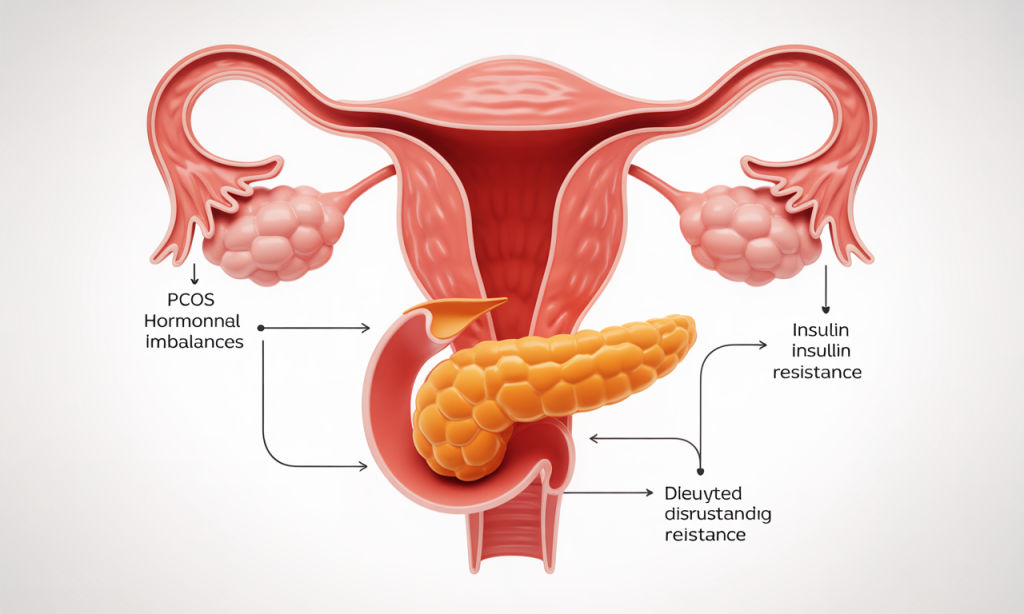
In many cases of PCOS, an underlying problem is insulin resistance, a condition in which the body’s cells don’t respond as they should to insulin. This, in turn, can result in elevated levels of blood sugar, more fat storage, and even pre-diabetes. Reducing insulin resistance with diet, medication, and lifestyle changes is frequently a priority in PCOS management.
Role of Hormones in PCOS
Hormones are key in PCOS. High androgens such as testosterone, low ratios of LH/FSH, and elevated insulin levels all play a role in the numerous symptoms associated with the condition. The treatment involves hormone therapies, dietary and lifestyle changes, and long-term , to correct these levels. Hence, the body can regain some normal ovarian function and metabolic balance.
The Stigma Around PCOS in Pakistan
Reproductive health is often a stigmatized topic in Pakistani society. Many women don’t discuss issues like menstrual disorders, infertility, or excessive hair growth because they are embarrassed. This results in a delay in diagnosis and the exacerbation of symptoms. Raising PCOS awareness and debunking the myths through education and conversation is key.
Common Myths About PCOS
There is no shortage of myths about PCOS. Some people believe it only involves overweight women, although lean women can have PCOS too. And some people think that PCOS always means infertility, when in fact, many women can get pregnant with the right interventions. Poor hygiene and birth control do not cause PCOS, and it’s harmful to think they do.
PCOS Awareness and Education
Public awareness programmes, particularly in schools and colleges, may help to empower young girls with information about their reproductive health. Inclusion of PCOS in healthcare programs related to women’s health can facilitate early detection. There is also a need to educate medical professionals to recognize, acknowledge, and treat PCOS well and sympathetically.
Living with PCOS: A Lifelong Journey
PCOS is not something that you just grow out of. It needs to be treated with the management of diet, lifelong monitoring, and sometimes medications as necessary. Women must be encouraged to self-manage their health, set achievable objectives, and ask for help when required. Living with PCOS can be more manageable with the right tools and education.
